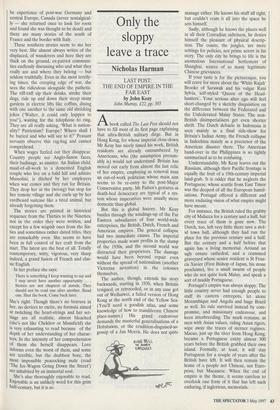Only the sloppy leave a trace
Nicholas Harman
LAST POST: THE END OF EMPIRE IN THE FAR EAST by John Keay John Murray, £22, pp. 385 Abook called The Last Post should not have to fill most of its first page explaining that ultra-British military dirge. But in Hong Kong, for whose imperial close-down Mr Keay has nicely timed his work, British residents are already outnumbered by Americans, who (the assumption presum- ably is) would not understand. Britain has moved out early from almost the last relic of her empire, employing as removal man an out-of-work politician whose main aim seems to be re-entry to the post-Major Conservative party. Mr Patten's gestures at death-bed democracy are typical of a sys- tem whose imperatives were usually more domestic than global.
But this is global history. Mr Keay bustles through the windings-up of the Far Eastern subsidiaries of four world-wide enterprises, the British, Dutch, French and American empires. The general collapse had two immediate causes. The imperial properties made scant profits in the slump of the 1930s, and the second world war distracted their proprietors. The damage would have been beyond repair even without the spread of nationalism (another Victorian invention) in the colonies themselves.
The author, though, extends his story backwards, starting in 1930, when Britain resigned, or retroceded, or in any case got out of Weihaiwei, a failed version of Hong Kong at the north end of the Yellow Sea. (You'll need a goodish atlas, and some knowledge of how to transliterate Chinese place-names.) His grand endeavour demands the masterful generalisations of a Hobsbawm, or the erudition-disguised-as- gossip of a Jan Morris. He does not quite manage either. He knows his stuff all right, but couldn't cram it all into the space he sets himself.
Sadly, although he knows the places well in all their Conradian sultriness, he denies himself the pleasure of physical descrip- tion. The coasts, the jungles, are mere settings for policies, not prime actors in his story. The only city he brings to life is the anomalous International Settlement of Shanghai, source of so many legitimate Chinese grievances.
If your taste is for the picturesque, you will crave for more about the 'White Rajah' Brooke of Sarawak and his vulgar Rani Sylvia, self-styled 'Queen of the Head- hunters'. Your serious alter ego will feel short-changed by a sketchy disquisition on the difference between the Federated and the Unfederated Malay States. The non- British disimperialisers get even shorter shrift. The Dutch debacle in Indonesia is seen mainly as a final side-show for Britain's Indian Army, the French collapse in Indochina mainly as a precursor of the American disaster there. The American hand-over in the Philippines is so tightly summarised as to be confusing.
Understandably, Mr Keay leaves out the Russians, although their Pacific frontage is equally the fruit of a 19th-century imperial land-grab. It is odder that he neglects the Portuguese, whose scuttle from East Timor was the deepest of all the European humil- iations. Portugal offered a different and more enduring vision of what empire might have meant.
For instance, the British ruled the grubby city of Malacca for a century and a half, but every trace of them is gone now. The Dutch, too, left very little there save a stol- id town hall, although they had run the place for the previous century and a half. But the century and a half before that again has a living memorial. Around an ugly ornate cathedral, and a crammed graveyard whose senior resident is St Fran- cis Xavier (First Bishop of Japan, his stone proclaims), live a small swarm of people who do not quite look Malay, and speak a sort of muddy Portuguese.
Portugal's empire was always sloppy. The little country never had enough people to staff its eastern entrepots, let alone Mozambique and Angola and huge Brazil as well. Its rule survived instead by com- promise, and missionary endeavour, and keen interbreeding. The mark remains, as men with Asian values, riding Asian tigers, wipe away the traces of sterner regimes. Macao, just up the river from Hong Kong, became a Portuguese entity almost 300 years before the British grabbed their own island. Formally, at least, it will stay Portuguese for a couple of years after the British have left. It will then remain the home of a people not Chinese, not Euro- pean, but Macanese. When the end of empire is the theme, it seems careless to overlook one form of it that has left such enduring, if inglorious, memorials.


































































 Previous page
Previous page